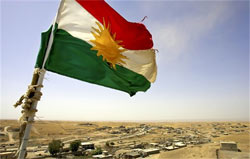 Christian Peacemaker Teams has had a team in Kurdistan for over one year. CPT has been slowly learning that the effects of the war and the relationship with the U.S. are much different for the Kurdish people than for the Arab people of central and south Iraq.
Christian Peacemaker Teams has had a team in Kurdistan for over one year. CPT has been slowly learning that the effects of the war and the relationship with the U.S. are much different for the Kurdish people than for the Arab people of central and south Iraq.
The Kurds are scattered throughout Turkey, Iran, Syria, and northern Iraq with the majority residing in Turkey. Turkey and Syria present the most repressive policies towards Kurds in not allowing them to speak their language or identify themselves as Kurdish.
The Iraqi Kurds by far have the best shot at becoming autonomous, but they have a long way to go before they can become their own nation. They are struggling to build an economic base. They are surrounded by hostile neighbors and know that a good defense system will involve diplomacy and trade.
When the U.S. took out Saddam, the Iraqi Kurds were ecstatic. In our first weeks here, Kurds initially shared their love for America. But when we engaged people long enough in conversation, they expressed their doubts, especially with regard to U.S. foreign policy. Still, they hoped that the U.S. would support them politically and economically.
In December 2007, the Turkish military attacked Kurds inside Iraq. The justification was to launch an attack against the PKK, a Kurdish militia based in the mountains that border Iraq, Turkey, and Iran. The PKK are considered a terrorist group by the U.S. and Turkey. The war between the PKK and Turkey has been going on for three decades.
In attempt to appease Turkey, the U.S. shared military intelligence and allowed Turkish bombers to fly inside Iraq. Turkey attacked more than 60 villages - killing and injuring civilians, displacing thousands of villagers, killing hundreds of livestock, and causing extensive property damage.
The Kurds felt betrayed. They had hoped that the U.S. would push Turkey towards the diplomatic table in order to work out the problems with the PKK peacefully. At the very least, they expected the U.S. to protect them since that is one of the responsibilities of an occupying country. Instead, the U.S. opened up the airspace inside Iraq, which allowed for the attacks. These attacks have been ongoing, including a major incursion by Turkish ground troops last week.
The once quiet criticism of the U.S. is now quite vocal. The U.S. is quickly losing an ally and further alienating itself in the Middle East. Anti-American sentiment grows deeper. When will we learn? Michele Naar-Obed, lives in Duluth, Minnesota, and is a member of the Loaves and Fishes Catholic Worker Community providing temporary housing to homeless families and individuals. She is a part time volunteer with the Christian Peacemaker Teams (CPT), has gone to Iraq five times with CPT, and is currently in Iraqi Kurdistan. Michele blogs at: duluthcpt.net
Michele Naar-Obed, lives in Duluth, Minnesota, and is a member of the Loaves and Fishes Catholic Worker Community providing temporary housing to homeless families and individuals. She is a part time volunteer with the Christian Peacemaker Teams (CPT), has gone to Iraq five times with CPT, and is currently in Iraqi Kurdistan. Michele blogs at: duluthcpt.net
Got something to say about what you're reading? We value your feedback!
